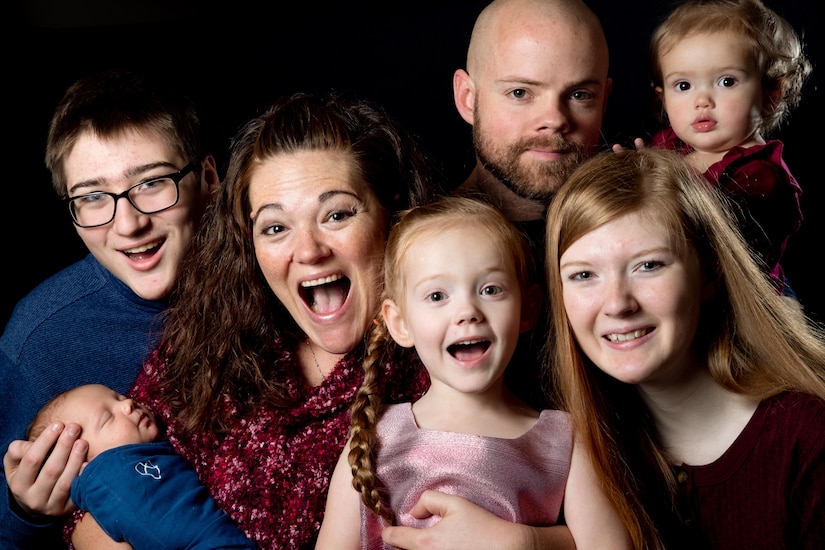April 17, 2020 | BY Katie Lange , DOD News
As an Army wife, Jessica Henninger is used to her husband
deploying and being away from the family. So, it was a surreal experience for
the nurse who had been out of the workforce to be the one saying goodbye while
her husband prepared to take care of their five kids as she left for a
different kind of war — the fight against COVID-19.
"For a military spouse who's used to the attention
always being on my husband and [people saying] 'Thank your husband for his
service,' for people to be saying that to me now is so weird," said the
38-year-old Henninger, who left over the weekend to help overwhelmed health
care workers in New York City, the epicenter of the coronavirus pandemic in the
United States.
Henninger put her own career on hold 18 months ago to take
care of the couple's kids, who are 16, 14, 5, 1 and 4 months. But before that,
she spent 20 years working in health care. Ten of those were as a nurse working
in intensive care and with patients on ventilators in respiratory units.
So, she's perfectly cut out for the battle against COVID-19,
and, once the crisis started ramping up, she knew she had to do something.
"There was this drive, I guess, just hearing all of the
stories about how bogged down the nurses were and the atrocious nurse-patient
ratios," Henninger said. "I thought, 'I have these skills, and
they're not being used.' I can be helpful. I can't … just sit here on these
skills doing nothing.'"
She found a position as a travel nurse — one who fills in at
hospitals with short-term staffing needs — and was so focused on helping that
she didn't contemplate having to leave her family behind.
"It wasn't until it got real — it got to me the night
before I was going to leave — that all of a sudden I started realizing, 'I'm
going to have to leave my baby,'" Henninger said of her 4-month-old son.
"That's when it really started getting emotional for me. The morning I
left, I was a mess."
Henninger's husband, Army Staff Sgt. Alex Henninger, is a
broadcast specialist. During his 12-year Army career, he's been away from his
family on deployments and other assignments for a fourth of that time. So,
she's aware of what her family is in for.
"I knew it was going to be difficult for them, me being
gone, but for me, it was just — we're nurses, and it's what we do,"
Henninger said.
Her husband understood.
"I was immediately on board with Jess's decision,"
Staff Sergeant Henninger said. "Her going to New York to do this is the
same as me deploying to film in a combat zone. Both scenarios put us in the
crucible of our training and experience. It's what we've prepared for our
entire careers. I couldn't be more proud."
By April 13, Jessica was in Manhattan at an orientation,
getting up to speed on what's going on at the hospital where she'll be working
for the next eight weeks.
"Essentially, they're using the hospital that I'm at as
an overflow for [COVID-19] patients as they start to stabilize and get a little
less acute," she said. "They're not as critical, at this point, as
they were when they first got sick."
She said her role will be a bit different from that of the
average travel nurse, considering that the workers at the hospital — which
she's been told not to name — don't usually work with patients suffering from
COVID-19 symptoms.
"Normally, as a traveler, you go in and you're the new
guy on the block, and you're looking to the more established staff to be, like,
'OK, you're my resource here,'" said. "But the [hospital] staff
members will more than likely be looking to us, since we've done all of these
types of things before."
She doesn't yet know if she'll have a set schedule for her
time in New York. What she has been prepared for, though, is the need to stay
flexible.
"They say that they're getting updates every single day
as to what the changes are and how we're proceeding with things, so everything
is just a really fluid situation, and we just have to be ready for
anything," Henninger said.
At first, she said she was a little nervous because she
hadn't practiced in a while, but after that first day, she felt much more
prepared.
"Going through the orientation process has reinforced
for me that, even though this is really an extraordinary time where we don't
know what to expect, … all of the things that I know how to do and that are
just a part of who I am as a nurse, none of that stuff has gone away,"
Henninger said.
She's finding comfort, too, in the fact that when it comes
to this virus, everyone is the new kid on the block. "We're all in this
together, learning new things and doing new things together," Henninger
said.









No comments:
Post a Comment